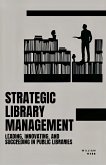Library management involves functions such as planning, organizing, leading, and controlling. Planning is about systematically making decisions about the library goals. Organizing is about assembling and coordinating human, financial, physical, informational, and other resources needed to achieve library goals. Leading is about functions that involve efforts on the part of the librarian to stimulate high performance by employees, and controlling about monitoring various library operations and services. These four management functions are highly integrated, but libraries that excel in organizing material resources and in leading their human capital are known to give better performance. Keeping in view the fact that libraries in adult education set ups are, by design, small budget libraries, confined to one room space, and adult education staff manages them manually on part time basis, these four management functions would occur in varying degree. In such a typical set up, the functions of organizing and controlling would receive greater attention compared to other two functions. Present work is a fruition of painstaking efforts with a view to highlight different dimensions of Library Science and the prospects thereof for those having an inclination towards it.
Dieser Download kann aus rechtlichen Gründen nur mit Rechnungsadresse in A, B, BG, CY, CZ, D, DK, EW, E, FIN, F, GR, HR, H, IRL, I, LT, L, LR, M, NL, PL, P, R, S, SLO, SK ausgeliefert werden.









